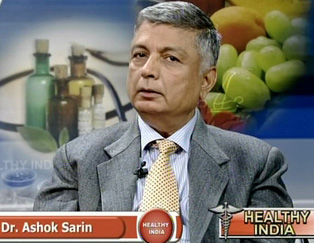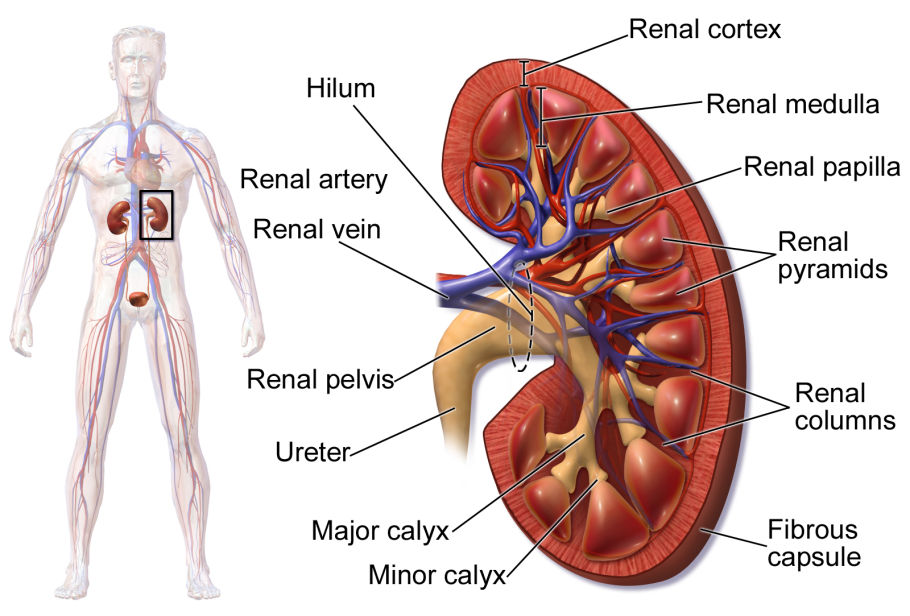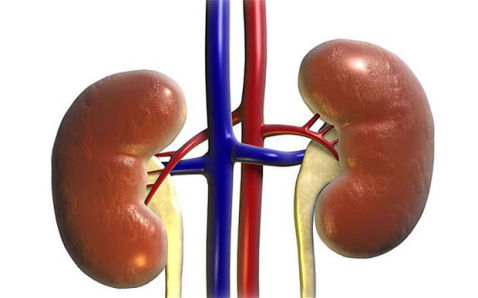In Children :
a) Excessive protein excretion in urine i.e. Nephrotic Syndrome.
b) Infections of urine and kidney e.g. Vescico-Ureteric Reflux (VUR)
In Adults:
i) Diabetic Nephropathy
ii) Hypertensive nephrosclerosis i.e. Kidney damage due to high blood pressure.
iii) Kidney stone disease i.e. Obstructive Uropathy.
iv) Adult Polycystic disease, Congenital i.e. by birth.
v) SLE more common in women.
When someone has kidney disease, the kidneys are damaged.
The kidneys no longer work well enough to remove wastes and excess fluids from the body. Complete kidney failure occurs when less than 10% of your kidneys are working. Toxins, waste products from foods and body cells, plus extra fluids build up in the blood. If the excess wastes and fluids are not removed, the whole body is affected. You will become ill from the build up of waste products and fluid.
CAUSES OF KIDNEY DISEASE
There are several different diseases and conditions that are known causes of kidney failure. For some people, however, the cause is never known.
The most common causes are :
Diabetes can damage the small blood vessels (glomeruli) in the kidneys.
Hypertension (high blood pressure that is not treated) can also damage the small blood vessels (glomeruli) in the kidneys. If the high blood pressure continues, the kidneys may fail.
Other causes
Glomerulonephritis is inflammation of the small blood vessels in the kidney. This disease usually affects both kidneys and causes steady damage. It may be hereditary.
Other diseases such as lupus may also damage the kidneys.
A blockage is any condition where urine cannot flow out of the kidney. The blockage makes it difficult for the kidneys to remove wastes and extra fluids. Obstructive uropathy is a blockage of urine flow out of the kidney, which may be caused by kidney stones or a birth defect of the kidney.
Infection is the most common disorder of the urinary tract. Cystitis is a bladder infection. Symptoms include urgent, frequent, painful urination. If not treated cystitis may lead to a kidney infection.
Pyelonephritis is a kidney infection that may be caused by a kidney birth defect. Someone who has this infection may or may not feel sick. Possible symptoms include fever, back pain, and chills.
Polycystic kidney disease (PKD), a hereditary condition, can lead to kidney failure. When someone has this disease, cysts grow and damage the kidneys. Then the kidneys enlarge, and eventually they stop working.
SYMPTOMS
Early on, people may not have any symptoms to tell them that their kidneys are not working well.
hat is why regular physical check up, with blood tests and urine tests, are so important. Test results may show signs of kidney disease even when a patient feels fine.
As the kidney disease progresses, a person may feel sick sometimes. But the change may be so slow that he or she does not do anything about these feelings. Symptoms may also be due to another illness or problem.
Complete kidney failure, however, causes many changes in the body, and people feel some stronger symptoms.
Symptoms vary from person to person.
Feeling generally sick
When the kidneys begin to fail, waste products will build up in the blood. This may cause a person to feel generally sick. Symptoms may include fatigue, nausea, vomiting, loss of appetite, itching, and/or disturbed sleep.
Fluid retention
The kidneys may produce less urine, which may cause extra fluid to build up in the body. This is called edema. People with this problem may have swollen hands and ankles. They may gain fluid weight, and/or may be short of breath doing activities such as walking or climbing a few stairs.
Anemia
The body will not produce as many red blood cells when the kidneys are not working. This is called anemia. People with anemia may feel weak and tired. A drug that acts like the body's own hormone, erythropoietin, stimulates the production of red blood cells. The drug may be used to treat this type of anemia.
Toxin build up
When the kidneys are not working to clean the blood, waste products called toxins will build up in the body. This may cause fatigue, loss of appetite, and may make the person's skin feel itchy.
Other symptoms
Other symptoms may include:
Headache
Diarrhea
Decrease in frequency of urination
Drowsiness or confusion
Puffiness around the eyes
Decreased interest in sex
Feeling cold



